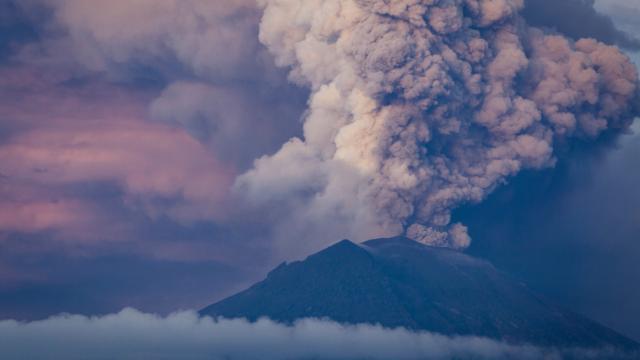Geoengineering our planet to solve climate change is one of the riskiest propositions humanity has ever considered. That’s largely because there’s no way to know all the consequences that come with reflecting sunlight back into space particularly when it comes to the agricultural system that has allowed humanity to flourish for millennia.
That’s sent scientists scrambling to find clues about what would happen, and there’s no better place to look than volcanoes.
A new study in Nature uses two historic eruptions to gauge how a global program of reflecting sunlight away from the Earth’s surface — an idea known as solar geoengineering — could impact agriculture. It finds that while cooling the planet could offset some of the negative impacts climate change will have on staple crops, it’s hardly a panacea.
The researchers mashed up a number of datasets to get a grip on the impact of volcanoes on agriculture in the past.
Specifically, they looked at how many aerosols — fine particles suspended in the atmosphere that have a cooling effect on the climate — the eruptions of Mount Pinatubo in 1991 and El Chichon in 1982 put into the atmosphere. They then compared that to the level of sunlight reaching the ground and crop yields for wheat, rice, soy and corn, crops that make up about half of the world’s caloric intake.
Their findings show that Pinatubo and, to a lesser extent, El Chichon put a damper on agricultural output. For Pinatubo, corn yields were depressed by 9.3 per cent and soy, rice and wheat by 4.8 per cent. Perhaps this isn’t surprising, since plants need sunlight to grow and Pinatubo reduced total sunlight by 2.5 per cent.
The impact of El Chichon was weaker, something the researchers said is likely due to a combination of fewer observations and different types of particles that eruption put in the atmosphere compared to Pinatubo.
But here’s the thing. Climate change is also expected to be a damper on crop output. Every degree Celsius increase in temperature will reduce corn yields by 7.4 per cent, according to research published last year. The study found other staples will suffer from declines as well as temperatures rise.
That’s why the researchers took their findings and plugged them into a model to look at future crop yields if we start to curb emissions slightly but temperatures continue to rise, and compared them to if emissions follow the same trajectory but we geoengineer the planet using what researchers call solar radiation management (SRM).
They found that cooling the planet with SRM does indeed help offset the impacts of climate change on agriculture, but the dimming impacts wash out those benefits, along with smaller impacts on changing rainfall patterns also tied with SRM. Basically, agriculture is still in trouble, and with it food security.
“If we think of SRM as an experimental surgery, our findings suggest that the side effects are as bad as the cure,” Johnathan Proctor, a PhD candidate at the University of California, Berkeley who led the research, told us.
“As a global community, we do not know nearly enough about the impacts of solar geoengineering to evaluate who would benefit, who would be harmed, and by how much — all of which are crucial to evaluate before deciding whether we ought to adopt a strategy with global effects.”
Alan Robock, a geoengineering researcher at Rutgers, told us the study was very interesting while noting it would be interesting to see how improvements to agricultural practices could affect things.
“More study of whether modern and future farming, including new equipment, seeds and fertilisers, would react the same way is needed,” he said. “There has been a huge increase in agricultural productivity since 1991, but the trends were removed in this paper.”
Gernot Wagner, a researcher at Harvard working on an outdoor solar radiation management experiment, also praised the paper while noting volcanoes only offer a snapshot of cooling. Geoengineering, in contrast, would be a long-term project we couldn’t suddenly just stop.
“That comes with important additional effects, the insolation effect being only one of them, and many of them deserve significant more study,” Wagner said.
“This is indeed an important and impressive study attempting to estimate the effects of volcanic eruptions on agricultural yields,” he continued. “It points to the need for much more research in this area in general.”
